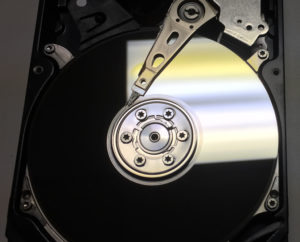Degaussing is a data sanitization procedure that destroys data by applying powerful magnetic fields.
Obviously, this only works on magnetic media — namely, hard disk drives (HDDs) and data storage tapes. When performed properly, degaussing irretrievably destroys data. Even with professional data recovery equipment, the information is lost forever.
If you need to sanitize a large number of hard drives or data tapes, degaussing is an effective option. However, like all data sanitization methods, there are risks and drawbacks.
How Hard Drive Degaussing Works
Hard drives contain platters coated with a thin magnetic material. When the drive operates, actuator heads read the charges from the platters and output data to the computer.

The magnetic charges on the platters can be positive or neutral. Essentially, the hard drive sets the magnets in one way or the other (the data is stored in a binary format).
Hard drives also use error correction codes (EOC) to prevent missing charges from causing data loss, and a single file may be stored in disparate locations — not just in one space on the platter. To sanitize data, you’ll need to eliminate all traces of the original magnetic charges.
Degaussers apply a powerful charge across the surface of all hard drive platters, destroying all data (including the data that the hard drive references during startup).
Some degaussers apply different types of charges to ensure that data is fully sanitized, and some data sanitization protocols call for several passes through degaussing equipment. In reality, once a hard drive passes through a degausser once, there’s a near-100% chance that it’s completely unrecoverable.
Advantages and Disadvantages of Degaussing for Data Sanitization
Degaussing isn’t appropriate for every data sanitization project. If you need to destroy a single hard drive, running it through a degausser is overkill — but if you’re working with a large library of media or you need to meet certain privacy/security standards, it’s a viable option.
Below, we’ll discuss the advantages and disadvantages. To discuss a specific data sanitization project, submit a case online or call 1-800-237-4200 to speak with an expert.
Advantages of Hard Drive Degaussing
- The degaussing process only takes a few seconds, so it’s ideal for mass HDD sanitization.
- Degaussing works on broken hard drives. Any magnetic storage device can be degaussed, regardless of whether it’s functional.
- Degaussing is permanent. Even with advanced data recovery equipment, the data is 100% irretrievable.
- After degaussing, media can be recycled to comply with environmental regulations.
Disadvantages of Hard Drive Degaussing
- Degaussers are expensive. A basic degausser costs about $3,600, while advanced models can cost $18,000 or more.
- Inexpensive models are available, but they’re not reliable for mass media sanitization. The magnetic fields of the degaussing equipment must be several times stronger than the magnetic material on the hard drive’s platters.
- Operator error can prevent total data sanitization. This is especially true if the hard drive must be positioned on the degausser in a specific way.
- Many data sanitization standards still require hard drive destruction after degaussing. The National Security Agency (NSA), for example, recommends media destruction.
- Degaussing a hard drive renders it permanently unusable.
Professional Options for Secure Data Sanitization
As the world leader in data recovery services, Datarecovery.com provides solutions for enterprise-level data sanitization. Our experts can maintain full chain-of-custody reports and produce other relevant documentation verifying compliance with relevant data security laws.
We work closely with our clients to develop an appropriate, cost-effective media sanitization strategy. All storage devices are thoroughly tested to ensure conformance with NIST/NSA sanitization guidelines, and sanitized media can be safely destroyed onsite.
To learn more about our media sanitization services, request a quote online or call us at 1-800-237-4200.





